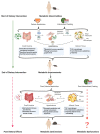Physiological Responses of Post-Dietary Effects: Lessons from Pre-Clinical and Clinical Studies
- PMID: 33498462
- PMCID: PMC7909542
- DOI: 10.3390/metabo11020062
Physiological Responses of Post-Dietary Effects: Lessons from Pre-Clinical and Clinical Studies
Abstract
Dieting regimens such as calorie restriction (CR) are among the most commonly practiced interventions for weight management and metabolic abnormalities. Due to its independence from pharmacological agents and considerable flexibility in regimens, many individuals turn to dieting as a form of mitigation and maintenance of metabolic health. While metabolic benefits of CR have been widely studied, weight loss maintenance and metabolic benefits are reported to be lost overtime when the diet regimen has been terminated-referred to as post-dietary effects. Specifically, due to the challenges of long-term adherence and compliance to dieting, post-dietary repercussions such as body weight regain and loss of metabolic benefits pose as major factors in the efficacy of CR. Intermittent fasting (IF) regimens, which are defined by periodic energy restriction, have been deemed as more flexible, compliant, and easily adapted diet interventions that result in many metabolic benefits which resemble conventional CR diets. Many individuals find that IF regimens are easier to adhere to, resulting in fewer post-dietary effects; therefore, IF may be a more effective intervention. Unfortunately, there is a severe gap in current research regarding IF post-dietary effects. We recognize the importance of understanding the sustainability of dieting; as such, we will review the known physiological responses of CR post-dietary effects and its potential mechanisms through synthesizing lessons from both pre-clinical and clinical studies. This review aims to provide insight from a translational medicine perspective to allow for the development of more practical and effective diet interventions. We suggest more flexible and easily practiced dieting regimens such as IF due to its more adaptable and practical nature.
Keywords: calorie restriction; dietary intervention; intermittent fasting; metabolic health; post-dietary; time-restricted feeding; weight regain.
Conflict of interest statement
The authors declare no conflict of interest.
Figures
Similar articles
-
Fasting for weight loss: an effective strategy or latest dieting trend?Int J Obes (Lond). 2015 May;39(5):727-33. doi: 10.1038/ijo.2014.214. Epub 2014 Dec 26. Int J Obes (Lond). 2015. PMID: 25540982 Review.
-
'For me it's about not feeling like I'm on a diet': a thematic analysis of women's experiences of an intermittent energy restricted diet to reduce breast cancer risk.J Hum Nutr Diet. 2018 Dec;31(6):773-780. doi: 10.1111/jhn.12571. Epub 2018 Jun 21. J Hum Nutr Diet. 2018. PMID: 29926996
-
The effect of weight management interventions that include a diet component on weight-related outcomes in pregnant and postpartum women: a systematic review protocol.JBI Database System Rev Implement Rep. 2015 Jan;13(1):88-98. doi: 10.11124/jbisrir-2015-1812. JBI Database System Rev Implement Rep. 2015. PMID: 26447010
-
Intermittent versus daily calorie restriction: which diet regimen is more effective for weight loss?Obes Rev. 2011 Jul;12(7):e593-601. doi: 10.1111/j.1467-789X.2011.00873.x. Epub 2011 Mar 17. Obes Rev. 2011. PMID: 21410865 Review.
-
Effects of timing of food intake and fat/carbohydrate ratio on insulin sensitivity and preconditioning against renal ischemia reperfusion injury by calorie restriction.Nutr Healthy Aging. 2019 Apr 2;5(1):23-32. doi: 10.3233/NHA-180044. Nutr Healthy Aging. 2019. PMID: 31093582 Free PMC article.
References
Publication types
Grants and funding
LinkOut - more resources
Full Text Sources
Other Literature Sources
Miscellaneous


